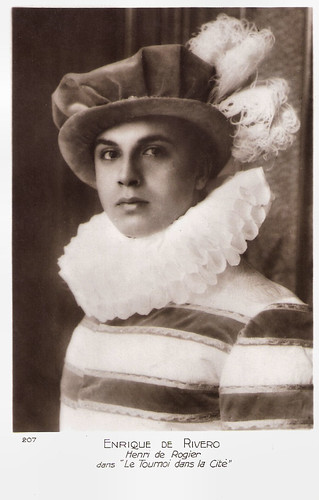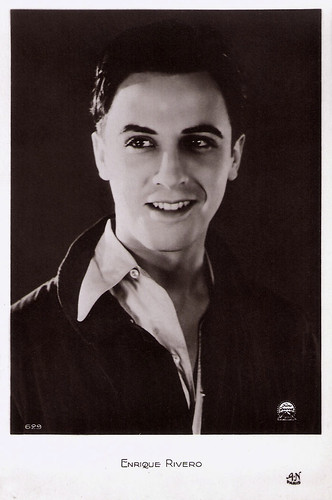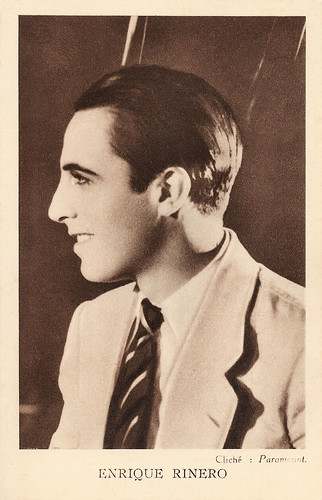Enrique Rivero (1906-1954) was a Chilean actor, who peaked in late 1920s and early 1930s French cinema. He was for a time seen as the Valentino of the European cinema and became famous for his lead in Jean Cocteau's Le sang d'un poète/The Blood of a Poet (1930).

French postcard by Cinémagazine-Edition, no. 207. Photo: publicity still for Le tournoi dans la cité/The Tournament (Jean Renoir, 1928), with Enrique (de) Rivero as Henri de Rogier. The film was scripted by Henry Dupuis-Mazuel. Sets by Robert Mallet-Stevens, costumes by George Barbier and exteriors shot at Carcassonne.
Enrique Rivero was born Enrique Riveros in San Fernando, Chile, in 1906. He was the eldest son of prominent businessman Enrique Riveros and Mrs. Hortensia Fernández Prado.
He travelled to Paris in 1922 to study agronomy, but against his family's wishes he soon became part of the art world and the historical avant-garde film that dominated the European scene and Paris. He mingled with a.o. Pablo Picasso, Man Ray, Gertrude Stein, Coco Chanel, Luis Buñuel, Lee Miller and the Viscount de Noailles.
From 1925, Riveros worked as supporting actor or as lead in over 15 films, credited as Enrique de Rivero or Enrique Rivero. His first films were Mon curé chez les pauvres/My Priest among the Poor (Donatien, 1925), Mon frère Jacques/My brother Jacques (Marcel Manchez, 1926) starring Dolly Davis, and Le chemineau/The trench (Maurice Kéroul, Georges Monca, 1926) starring Henri Baudin.
He appeared in two Swedish films Ungdom/Youth (Ragnar Hyltén-Cavallius, 1927) starring Ivan Hedqvist, and Spökbaronen/Ghost Baron (Gustaf Edgren, 1927) starring Fridolf Rhudin, and in the German-Swedish production Majestät schneidet Bubiköpfe/Majesty cuts bobble heads (Ragnar Hyltén-Cavallius, 1928) opposite Hans Junkermann.
Jean Renoir directed him in two late silent films, the costume drama Le tournoi dans la cite/The Tournament (1928) and the adventure film Le bled/The Bled (1929), in which he co-starred with Jackie Monnier. In the late 1920s and early 1930s, Rivero's fame and success were so bright, that he continuously appeared on European film magazine covers, considered as the new Rudolph Valentino.

French postcard by A.N., Paris, no. 629. Photo: Paramount.

Belgian postcard by Kivou, Vilvoorde. Photo: Paramount.
In 1930, Enrique Rivero appeared as the protagonist of Le sang d'un poète/The Blood of a Poet (1930), the first film by French artist Jean Cocteau, and considered one of the highlights of surrealist cinema. Because of its presumed blasphemous content and because of the riot over L'Age d'or by Luis Buñuel and Salvador Dali, the film was only released in 1932.
Todd Kristel at AllMovie: "Inspired by the myth of Orpheus and details from Jean Cocteau's own life, The Blood of a Poet is a fascinating, but somewhat confusing look at the struggle to create art. (...) the movie is unusual because Cocteau wanted to express his ideas in a creative way and not simply because he wanted to confuse people."
In the first part of the film an artist (Rivero) sketches a face of which the mouth starts moving; rubbing the mouth it sticks to his hand, and later on to an armless female statue (Lee Miller). Incited by the statue come to life, he passes a mirror and enters a magic world, looking through various keyholes. In the end he returns, smashes the statue, his ambiguous muse, and becomes a statue himself.
Rivero also acted in two early sound films by Alberto Cavalcanti in the Paramount studios in Joinville. The first was Dans une île perdue/On a lost Island (1931) with Danièle Parola, an alternative language version of Dangerous Paradise (William Wellman, 1930) with Nancy Carroll and Richard Arlen. The other was À mi-chemin du ciel/Halfway Up the Sky (1931) with Janine Merrey, an alternative language version of Half Way to Heaven (George Abbott, 1929) with Chrales 'Buddy' Rogers.
Among his other films were the Spanish-French coproduction La bodega/Wine Cellars (Benito Perojo, 1930), with the actress and singer Concha Piquer, Nicole et sa vertu/Nicole and her Virtue (Rene Hervil, 1932), starring Alice Cocéa, and the drama Le picador/The Picador (Lucien Jaquelux, 1932).
Shortly before the outbreak of World War II, Enrique Riveros returned to Chile for unknown reasons, leaving behind fame, fortune, and a wife and daughter. Swedish Wikipedia suggests he was involved in attempts on his life because of private jealousy affairs.
In Chile, Enrique Riveros led a quiet life, worked on a couple of film projects and starred under his birthname in the thriller El hombre que se llevaron/The man who took (Jorge 'Coke' Delano, 1946). For his role of defendant Alberto, Rivero received the award for Best National Film Actor.
Enrique Riveros died in 1954, all too soon - and all too soon forgotten.
Three gifs from Le sang d'un poète/The Blood of a Poet (1930). Source: GIPHY.
Sources: AllMovie, Wikipedia (English and Swedish), and IMDb.

French postcard by Cinémagazine-Edition, no. 207. Photo: publicity still for Le tournoi dans la cité/The Tournament (Jean Renoir, 1928), with Enrique (de) Rivero as Henri de Rogier. The film was scripted by Henry Dupuis-Mazuel. Sets by Robert Mallet-Stevens, costumes by George Barbier and exteriors shot at Carcassonne.
The new Rudolph Valentino
Enrique Rivero was born Enrique Riveros in San Fernando, Chile, in 1906. He was the eldest son of prominent businessman Enrique Riveros and Mrs. Hortensia Fernández Prado.
He travelled to Paris in 1922 to study agronomy, but against his family's wishes he soon became part of the art world and the historical avant-garde film that dominated the European scene and Paris. He mingled with a.o. Pablo Picasso, Man Ray, Gertrude Stein, Coco Chanel, Luis Buñuel, Lee Miller and the Viscount de Noailles.
From 1925, Riveros worked as supporting actor or as lead in over 15 films, credited as Enrique de Rivero or Enrique Rivero. His first films were Mon curé chez les pauvres/My Priest among the Poor (Donatien, 1925), Mon frère Jacques/My brother Jacques (Marcel Manchez, 1926) starring Dolly Davis, and Le chemineau/The trench (Maurice Kéroul, Georges Monca, 1926) starring Henri Baudin.
He appeared in two Swedish films Ungdom/Youth (Ragnar Hyltén-Cavallius, 1927) starring Ivan Hedqvist, and Spökbaronen/Ghost Baron (Gustaf Edgren, 1927) starring Fridolf Rhudin, and in the German-Swedish production Majestät schneidet Bubiköpfe/Majesty cuts bobble heads (Ragnar Hyltén-Cavallius, 1928) opposite Hans Junkermann.
Jean Renoir directed him in two late silent films, the costume drama Le tournoi dans la cite/The Tournament (1928) and the adventure film Le bled/The Bled (1929), in which he co-starred with Jackie Monnier. In the late 1920s and early 1930s, Rivero's fame and success were so bright, that he continuously appeared on European film magazine covers, considered as the new Rudolph Valentino.

French postcard by A.N., Paris, no. 629. Photo: Paramount.

Belgian postcard by Kivou, Vilvoorde. Photo: Paramount.
Attempts on his life and jealousy affairs
In 1930, Enrique Rivero appeared as the protagonist of Le sang d'un poète/The Blood of a Poet (1930), the first film by French artist Jean Cocteau, and considered one of the highlights of surrealist cinema. Because of its presumed blasphemous content and because of the riot over L'Age d'or by Luis Buñuel and Salvador Dali, the film was only released in 1932.
Todd Kristel at AllMovie: "Inspired by the myth of Orpheus and details from Jean Cocteau's own life, The Blood of a Poet is a fascinating, but somewhat confusing look at the struggle to create art. (...) the movie is unusual because Cocteau wanted to express his ideas in a creative way and not simply because he wanted to confuse people."
In the first part of the film an artist (Rivero) sketches a face of which the mouth starts moving; rubbing the mouth it sticks to his hand, and later on to an armless female statue (Lee Miller). Incited by the statue come to life, he passes a mirror and enters a magic world, looking through various keyholes. In the end he returns, smashes the statue, his ambiguous muse, and becomes a statue himself.
Rivero also acted in two early sound films by Alberto Cavalcanti in the Paramount studios in Joinville. The first was Dans une île perdue/On a lost Island (1931) with Danièle Parola, an alternative language version of Dangerous Paradise (William Wellman, 1930) with Nancy Carroll and Richard Arlen. The other was À mi-chemin du ciel/Halfway Up the Sky (1931) with Janine Merrey, an alternative language version of Half Way to Heaven (George Abbott, 1929) with Chrales 'Buddy' Rogers.
Among his other films were the Spanish-French coproduction La bodega/Wine Cellars (Benito Perojo, 1930), with the actress and singer Concha Piquer, Nicole et sa vertu/Nicole and her Virtue (Rene Hervil, 1932), starring Alice Cocéa, and the drama Le picador/The Picador (Lucien Jaquelux, 1932).
Shortly before the outbreak of World War II, Enrique Riveros returned to Chile for unknown reasons, leaving behind fame, fortune, and a wife and daughter. Swedish Wikipedia suggests he was involved in attempts on his life because of private jealousy affairs.
In Chile, Enrique Riveros led a quiet life, worked on a couple of film projects and starred under his birthname in the thriller El hombre que se llevaron/The man who took (Jorge 'Coke' Delano, 1946). For his role of defendant Alberto, Rivero received the award for Best National Film Actor.
Enrique Riveros died in 1954, all too soon - and all too soon forgotten.
Three gifs from Le sang d'un poète/The Blood of a Poet (1930). Source: GIPHY.
Sources: AllMovie, Wikipedia (English and Swedish), and IMDb.
No comments:
Post a Comment